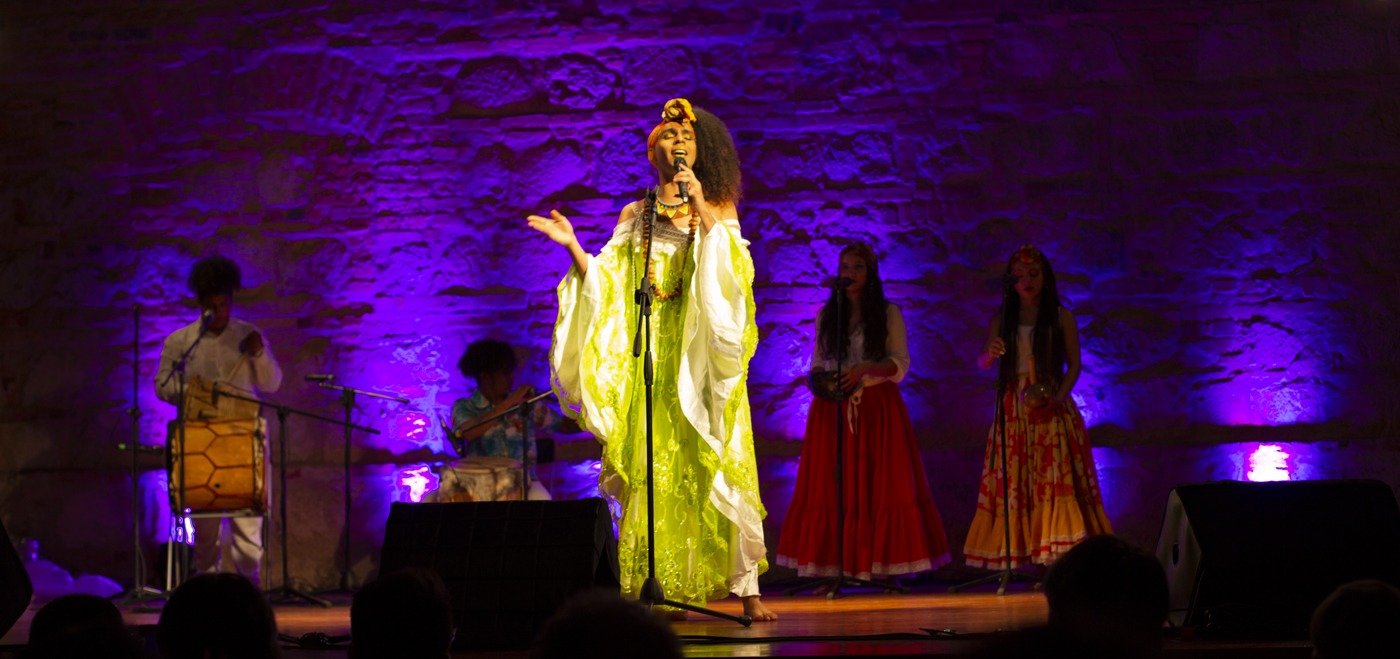Gerson Morena was born 28 years ago in Santander, in a family that was fond of music and with a father who was a police officer. Since she was little, he appropriated the rhythms of drums and bagpipes, and with his powerful voice and his impressive staging, an important space has been opened among the artists of traditional Colombian music.
But traditional Colombian music is conservative, it’s racist and it’s macho. For this reason, Gerson Morena has had to put his body and fight for his place. She taught herself to play the bagpipes, to sing and to compose his own songs, which speak of displacement, racism and transphobia, but also her own discoveries about his sexual and racial identity.
Today, Gerson Morena is recognized as a singer of what she calls Afro travesti bullerengue. And this is her story, told in her own words, about what has been his journey in music and through the country, and his search to build his body as a territory that he inhabits, recognizes, defends and narrates.
The bullerengue is political
One of my first approaches to music was with the pots in my house. I grew up with vallenato, with tropical music, with cumbia. My mom tells me that when she was very young, she would take the pots out of the kitchen to play them like a drum, because she felt that the drums were part of me. Then I started singing.
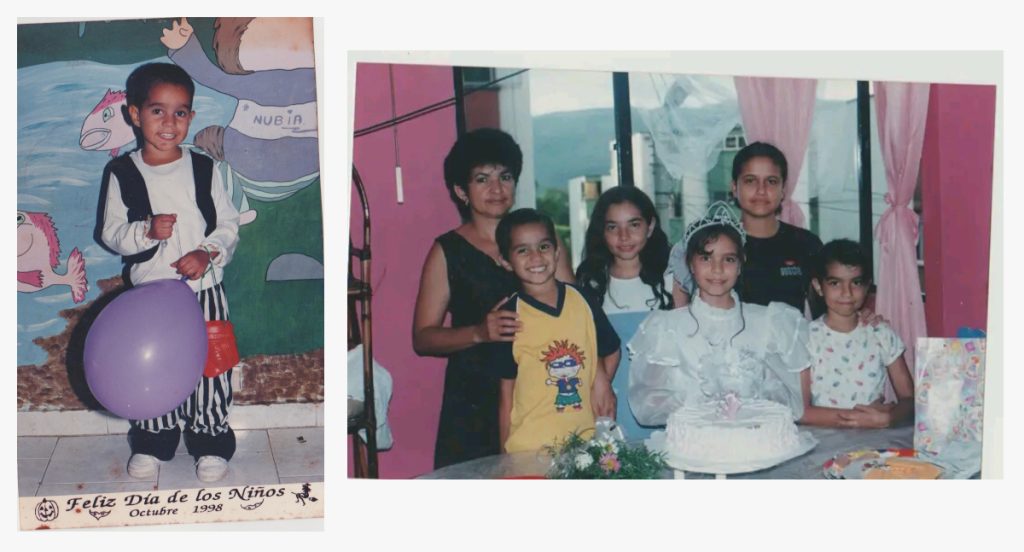
At the age of 10 I began to feel a feeling with traditional music, at 12 I began to attend dance schools, dancing tambora at school cultural events and at 13, in one of those presentations, a pelao who had his tambora began to play and told me “sing. Sing that I have heard him sing”. This was the first song I sang in public.
a flower is reborn
Since we had those more Afro features, in school presentations they always sent us to play the role of black, of Indian. I hated my skin, I hated my features, I wanted to whiten. I used much clearer powder, I went like a pamper to school and then to the university. I saw that the same homosexuals liked white, ripped guys and I was well tanned, dark and my hair was not pretty. It was a pretty strong time because of my identity and my sexual orientation. I physically violated myself for a long time in this denial.
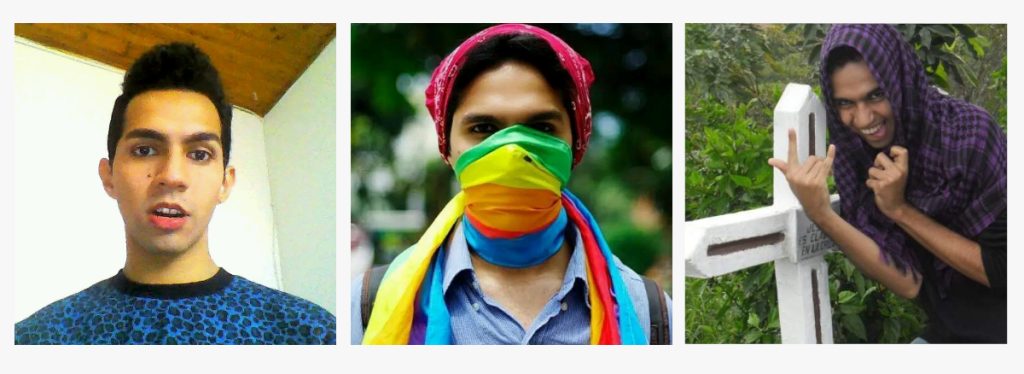
Eventually it passed me by. In college I started singing in theater patches and everything led me back to the drums. Traditional music, theater and dance would allow me to heal that bond of femininity and race-gender as a whole.
But it was not easy. I remember that the only day they let me sing at the university, at a graduation ceremony, I chose a song by Totó. I put on the pants, the shirt and the ‘rabo e gallo’ scarf that men traditionally wear, but I put on the scarf that I always wear to sing on my head. In the middle of the presentation, the director sent one of the musicians to shave my scarf. I kept singing but with a broken voice, with anger, wanting to cry. I think that was the first thing that struck me.
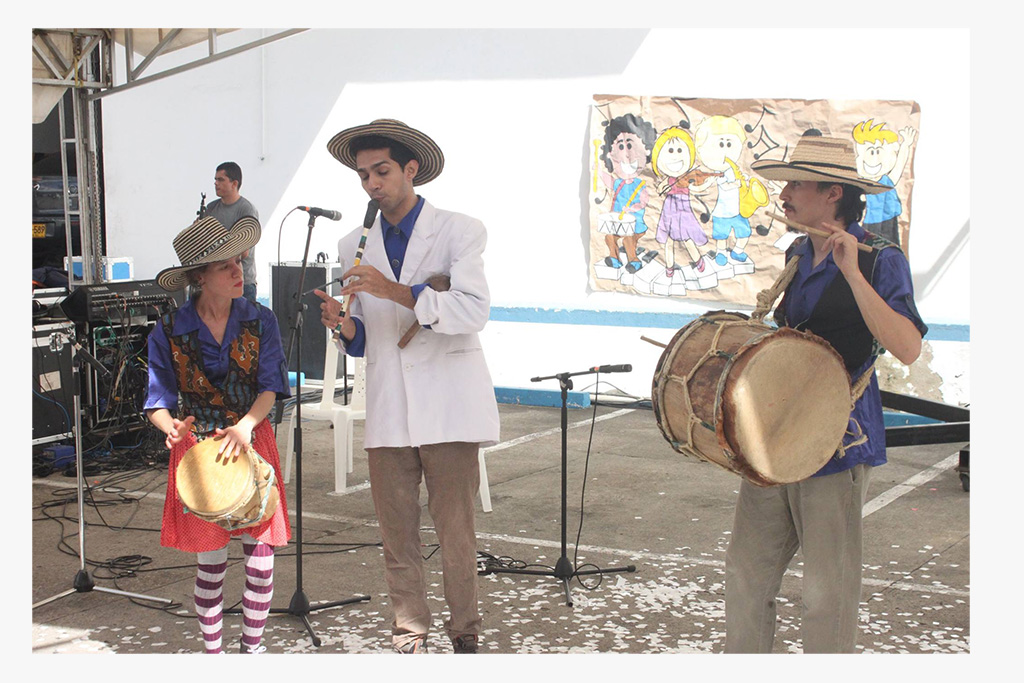
The street formed me in music. I learned to sing in public in parks, at traffic lights, with the group called ‘Cueros Rotos del Chicamocha’. The police were chasing us, they held me and almost disappeared for about 24 hours in a CAI. I experienced police, state, sexist violence and the conflict in the neighborhood. There were pamphlets on the corners that said: “if his son is healthy, put him to bed early, not a bitch, not a fag”.
A child cries in the mountains of María de Petrona Martínez
I also got close to the victims of the so-called ‘false positives’, I was in various memory processes and there I began to understand that bullerengue is political. That he is very powerful and transformative. That narrating it in person present on a stage is a declaration of war, a joyful provocation to this world that kills.
If they are going to kill me, let them kill me singing
The otherness that others in Santander made me suffer was so great that I had to go looking for my identity in another field, in a place where Afro was recognized. He had to leave me to heal me, of soul and spirit, and I ended up on the Atlantic Coast.
First I came to Santa Marta. At first I was accompanied only by my bagpipes, my voice, and my maraca. I participated in three Cumbia festivals in Banco, Magdalena, but they always kicked me out because the lyrics of my songs were “too political”. I didn’t sing about how beautiful it was to wake up with the song of the nightingale, but about what had happened in the Magdalena River, about why they had killed so many people.
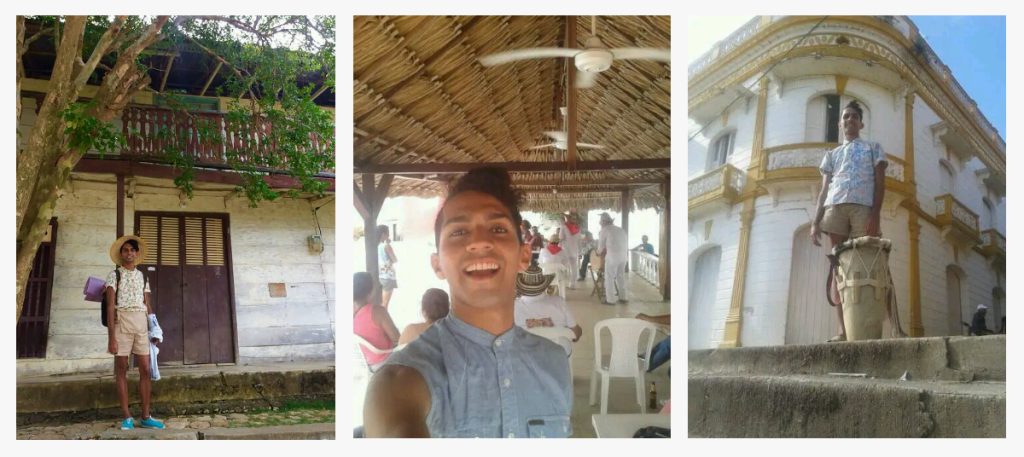
I love cumbia because because of it I was able to survive. I played my bagpipe, the short bagpipe, the same one they call the ‘Machihembriada’ or the chuana. Some say that Chuana is a very important hermaphrodite goddess for the Zenú, who sometimes appears as a man and sometimes as a woman. That is why I say that I did not choose the short bagpipe but that she chose me: I am the one who plays the transvestite bagpipe, that she has everything to do with me.
The way I played that bagpipe seemed strange to people because the short bagpipe is played with two hands, but I only play it with one hand and I play the maraca with the other. I told them: this is another bagpipe, it’s my bagpipe!
On my way through the Coast I met Tatiana, a lesbian woman, a drummer, and together with her I decided to make music from my own seafood shop. We went to San Antero, to Lorica, to Cereté, to Sahagún, we toured Córdoba meeting musicians and festivals. It was tough: a lesbian and a fagot doing traditional music.
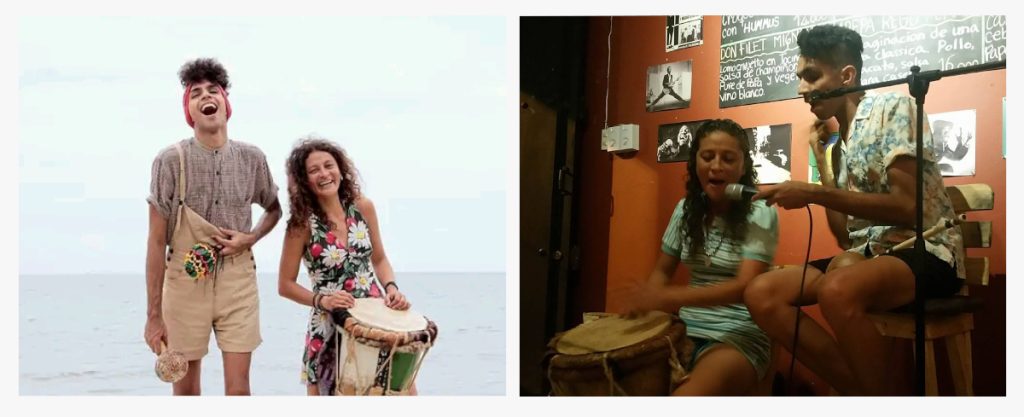
In Puerto Escondido the paramilitaries almost killed us. People did not want to attend to us and there was a time when everyone was on guard, there was not a soul in the streets, nor the Police. I remember that I told Tatiana: I am going to take out my bagpipes and my maraca because I feel a heavy energy. If they kill me, I told him, let them kill me singing. She took the drum out of her and we started playing. A guy dressed in black approached us, got off the motorcycle and showed us the pistol he had on her waist. I closed my eyes but kept on singing. Tatiana was trembling, she was crying and I told her: don’t stop. We kept singing and the guy just laughed, took the bike and left.
The bullerengue saved us. The drums saved us. This beautiful energy saved us.
Later I arrived at Palenque. Palenque for me means a spiritual encounter and recognition. I love Palenque. It helped me put an end to the starting point of my Afro recognition traversed from gender.
there on the seashore
In the Montes de María another song was born that we made for a short film called ‘Cuerpa y tierra’, a fictional story that was based on the testimonies of displacement of LGBTI people during the armed conflict. The short had soundtracks with my music and won a film festival in Montes de María. Teaser ‘Body and Eartha’
mount mary
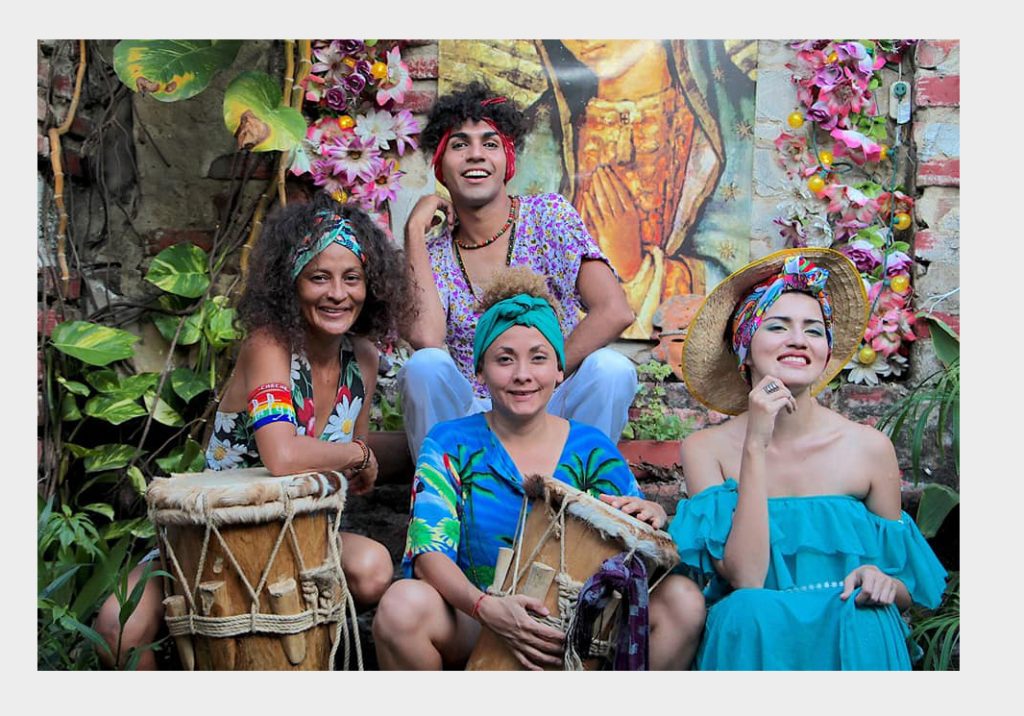
In Sincelejo I met a group of girls who liked bullerengue and we formed Cosa Brava. We were going to play at parties for lesbians and gays, because traditional venues are super violent: in Morroa they treated us ugly, they took Tatiana’s drum, they kept me quiet, with the bagpipes or with the mille. The musicians told us: oh no! That group of women and fags is useless here.
Nobody taught me. I went to festivals a lot but I never went to participate –except in the cumbia one– because they were not going to allow me to participate as a fag or with a skirt. I took all this from the same environment, listening, living. I put the body. I had to live it.
Little by little, people received my proposal and in the territories where I was they recognized my work. In Palenque they called me a singer, because I compose, because I create my own songs. It’s a delicate question: it’s not that I learned two or three little songs and that’s it, I’m a singer, there’s a question of sonority and beyond a title, it’s an experiential recognition.
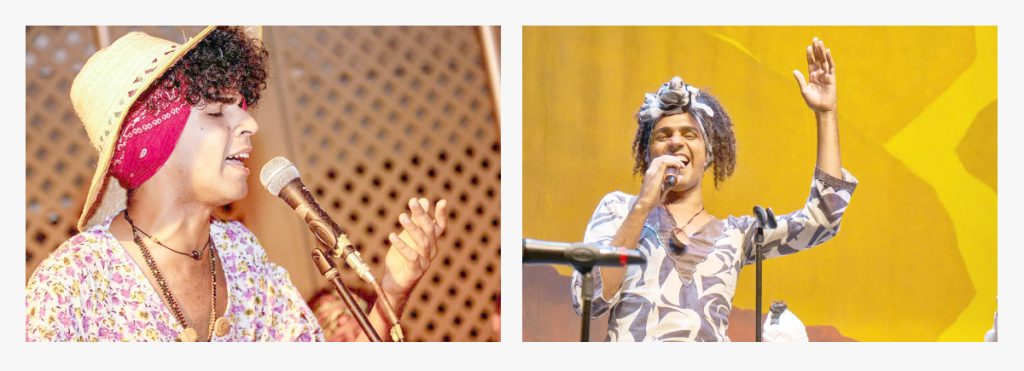
Which Brown; Morena, Gerson Morena
The last time I was working in Montería but I was in a crisis because the projects had been dissolved, there was a lot of machismo, few opportunities and I began to have a lot of need. So I decided to leave for Bucaramanga and there I continued in a situation of quite strong depression, I spent a year very ill. One day, the Bucaramanga School of Art opened an Afro-Colombian music group and I got involved. I decided to stay. I began to resume my life, to play and sing again.
bullerengue skin
Maria Flores
Before I left I made María Flores, a song about the femicide of a cousin. It was a story that no one told and although her husband killed her, murdered her, no one called it a femicide.
I was fed up with so much violence, with so much transphobia and racism. I said: I am going to create my own brand, so that people recognize that I am this fagot who makes bullerengue, who comes from these hot mountains, with this river turned into a sewer, telling my story. This is how the idea of calling me was born The Morena del Chicamocha. Since my last name is Moreno, I feminized my last name, I transvestite it. I said: no, like Moreno; Morena, Gerson Morena.
in present body
Some time later I realize that my cycle in Bucaramanga is over, I needed a change. I arrived in Bogotá and met many good and beautiful people who received me and we continued making music.
white house
Also in the body there have been changes and I decide how to build mine.
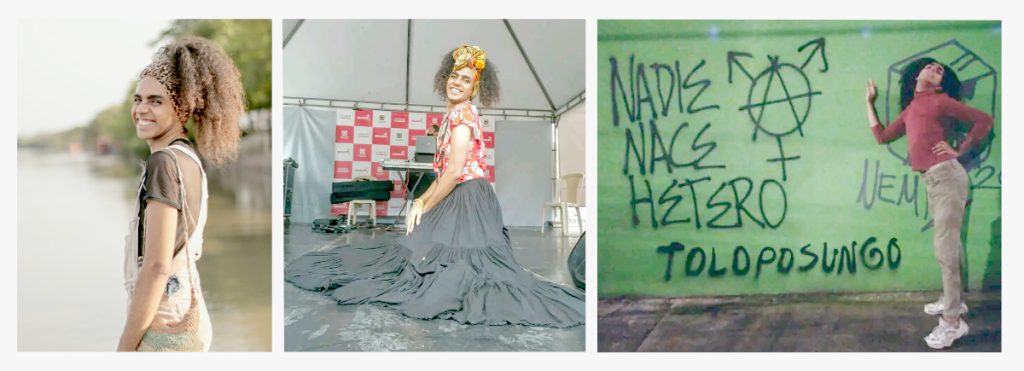
I want my construction to be as healthy as possible, from a question that is much more political than performative: I do not have to force my body to follow femininity standards to fit into a role that is derisory and for which many friends and acquaintances have died. . The construction of my identity will be constant throughout my life and it does not depend on how many acrylic nails I have or how many heels I wear. Narrating in the present body is talking about the body as a territory and as a life story.
hairkiller
For me bullerengue is a form of spirituality without labels, but there are some realities that are implicit in my life and that is why I call it afro travesti bullerengue because what is not named does not exist. I do not claim to represent all transgender stories, or the diverse population, but I do believe that my songs tell a lot about some of those stories that we all have in common.
La Morena del Chicamocha is, then, a commitment to the recovery of memory, to the vindication of the ancestral role that we fagots, lesbians, transvestites and dissidents have had in traditional music. And today I continue to reaffirm myself as that fagot, transvestite, Afro-mestizo, bullerenguera who stands up from this place to tell you that we have to transform the history of our country.
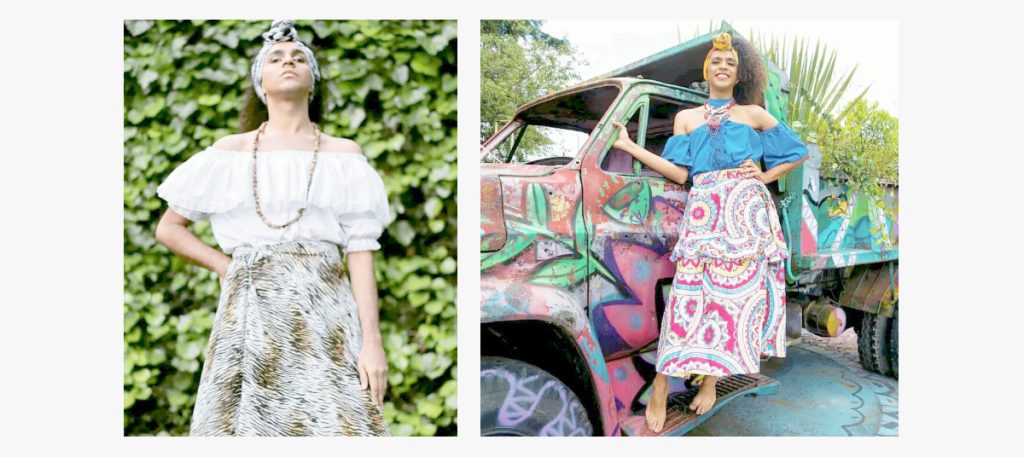
I’m not going to do one more night show at Pride. I came to tell a story that needs to be told by our own voices, not by external voices.
Let me cry
*Thanks to Juan Carlos Tocua for recording the songs.
“If they are going to kill me, let them kill me singing” – Cerosetenta

